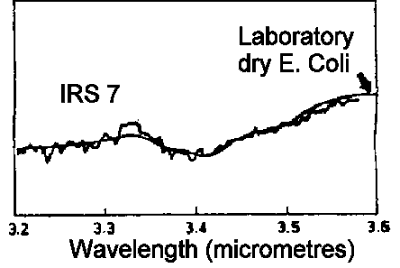 |
Science Frontiers ONLINE No. 32: Mar-Apr 1984 |
|
|
An Even Larger Ocean Of Life
Fred Hoyle has written another book, The Intelligent Universe; A New View of Creation and Evolution. The subject matter is irresistible and, to make things more interesting, New Scientist has published a scathing review of it, castigating Hoyle for his doubts about evolution and terming his approach "dispicable." (My! How conventional people hate unconventional people!)
In this new book, Hoyle goes far beyond his previous thesis, which in essence declared that from statistical considerations life could not have arisen and evolved on earth. Rather, life had to come from outer space, probably in the form of bacteria and viruses. Evolution was and is dependent upon new information arriving from outer space on tiny bits of life. Hoyle now greatly extends his theory:
"But where did a knowledge of amino acid chains of enzymes come from? To use a geological analogy, the knowledge came from the cosmological equivalent of a previous era, from a previously existing creature if you like, a creature that was not carbon-based, one that was permitted by an environment that existed long ago. So information is handed on in a Universe where the lower symmetries of physics -- and characteristics of particles and atoms -- are slowly changing, forcing the manner of storage of the information to change also in such a way as to match the physics. It is this process that is responsible for our present existence, and it is the one which our descendants would be fated to continue."
To continue his search for the ultimate, Hoyle recognizes that, contrary to what transpires in the inorganic world, life as-a-whole is actually gaining order and information. He sees life leading the universe forward to a remarkable future:
"That biological systems are able in some way to utilise the opposite time-sense in which radiation propagates from future to past. Biology works backwards in time. Living matter responds to quantum signals from the future, instead of the Universe being committed to increasing disorder and decay, the opposite could be true. The ultimate cause being a source of information, an intelligence if you like, placed in the remote future."
(Halstead, Beverly; "Fred Hoyle's Gods," New Scientist, 100:940, 1983.)
Comment. In most religions, the great act of creation by a supreme intelligence occurred in the distant past. Hoyle sees this supreme intelligence residing in the future beckoning us on. No wonder the the book was treated harshly.
 | Hoyla and his colleague, N.C. Wickramasinghe, believe this spectrum of GC-IRS6, which closely follows the laboratory spectrum of the bacterium E. Coli, is strong evidence for the presence of bacteria in space. |